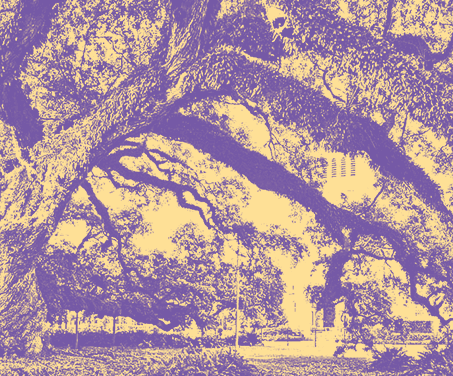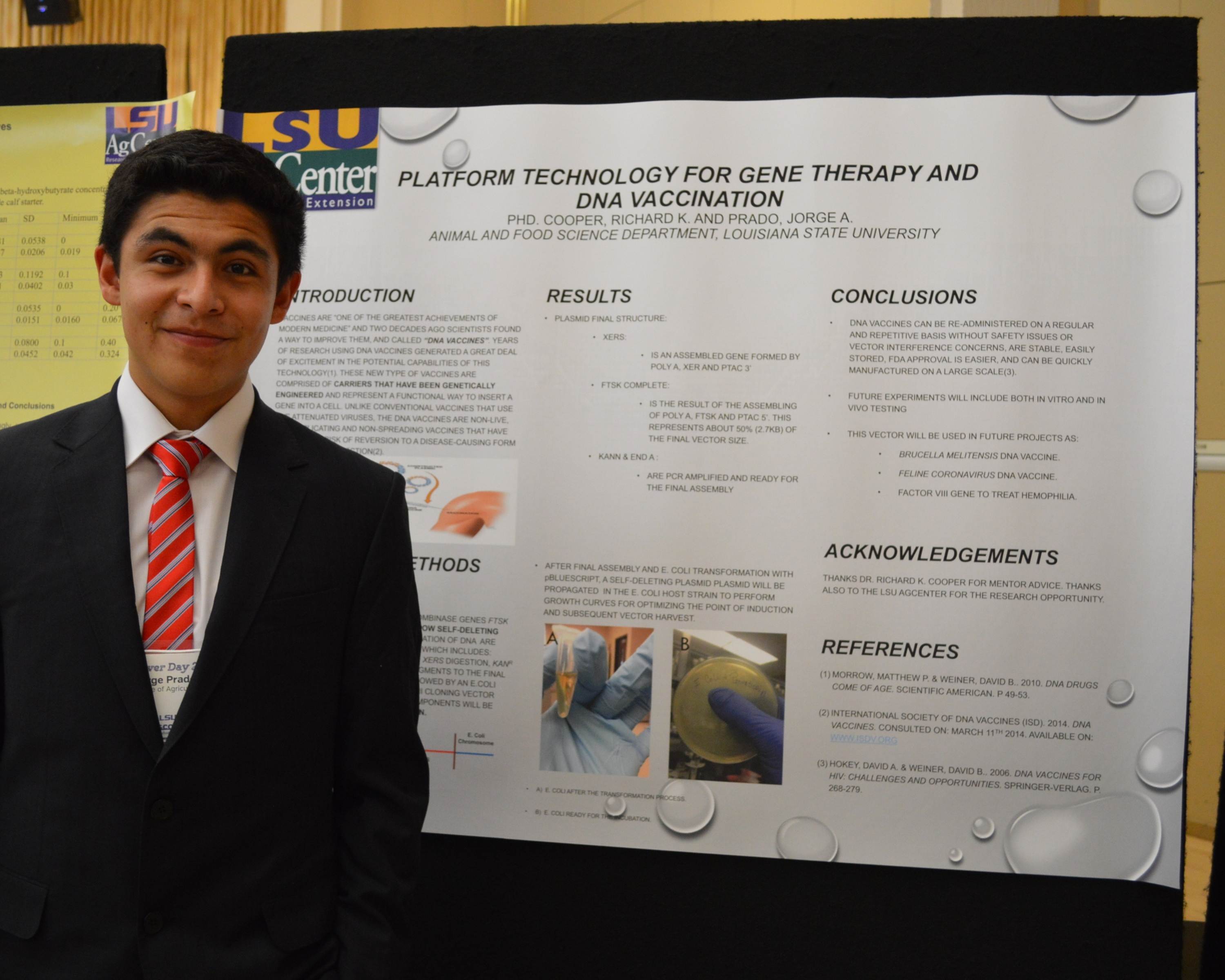Research Grants
Undergraduate Research Grants
Each year, the College of Agriculture offers competitive undergraduate research grants to support the engagement of undergraduate students in faculty-mentored research. Research can be in any area of study in the College of Agriculture, but projects must be under the direction of a College of Agriculture faculty member. Multidisciplinary projects are encouraged. Student investigators should take the lead on proposals with guidance from faculty advisors. Multiple proposals with the same faculty advisor(s) must be independent projects. Faculty mentors may submit a maximum of two proposals. Where applicable, reports from previously funded College of Agriculture undergraduate research grants must be attached, including verification of participation in a College of Agriculture or LSU sponsored poster competition. Grants will be administered in the department/school with the assistance of cost center managers (CCMs). The number of grants awarded will depend on the availability of funds in Millard Perkins Endowment. Failure to complete all deliverables will result in the withholding of awarded grant funds.
Students must be enrolled for the duration of this year-long project and must not be scheduled to graduate before May 2027.
There are two award types:
Level 1
The College of Agriculture’s Millard Perkins Endowment funds Level 1 awards and is limited to a maximum of $3,000 per grant. Students must have a minimum 2.5 GPA to apply for Level 1 funding. Funds may be used for supplies, operating services, and travel (i.e., any non-personnel expenses). Funds may not be used for salaries or wages for College of Agriculture students. Students may receive academic credit under appropriate research or special topic courses within a unit.
Level 2
The LSU AgCenter will provide additional support to those undergraduate researchers receiving awards. These students can earn a maximum of $4,000 at an hourly wage and schedule, including summer employment, agreed upon by the student and faculty mentor(s). In order to qualify for this support, undergraduate researchers must be a College of Agriculture student, have a minimum LSU GPA of 3.00 with at least 30 hours of earned degree credit and meet the LSU AgCenter hiring eligibility requirements. This is not a requirement to participate in the College of Agriculture’s competitive grant program and students can choose only to receive the research funding without employment (Level 1). Selection of successful candidates to receive LSU AgCenter Level 2 funding will occur separately (using the same nomination materials) after the College of Agriculture has completed its process.
2026-27 Grant Application Information
Proposals will be evaluated and ranked by a faculty committee. Funding amounts are determined by this ranking. Key dates are listed below:
- Application Opens: January 1, 2026
- Application Deadline: February 1, 2026 (submit electronically to Jonathan Thomas at jthomas6@lsu.edu)
- Award Notification: March 1, 2026
- Grant Funding Period: March 15, 2026 to March 15, 2027
- Title Page - 1 page
- Title
- Beginning and ending date
- Type of Award: Level 1; Level 2; Levels 1 & 2
- Student Investigator(s) Names and Signature(s)
- Faculty Supervisor(s) Name, Department, and Signature(s)
- Department Head Signature
- Project Description - 3 pages maximum
- Introduction
- Objectives
- Procedures/Methodology
- Timeline of project
- Significance
- References Cited - 1 page
- Proposed Budget* (with narrative) - 1 page
*Level 2: additional budget page and narrative, description of work for student wages - Student Resume(s)* - 1 page/student
*Level 2: must include undergraduate researcher(s)’ current LSU GPA and degree credit hours earned - Previous Support - For each person involved in the proposed project, list previous College of Agriculture undergraduate research grants received in the last five years and attach copies of the final reports from these grants.
*For Level 2 funding, be sure to include the required information in Parts IV & V above.
- Final Report - a full report of results, including proposed presentations, publications and possible patents must be submitted to the Jonathan Thomas (Student Services Coordinator) jthomas6@lsu.edu, within 30 days of the completion of the research (ending date of grant).
- Financial Statement - a complete financial statement must also be submitted with the final report.
- Poster - a large format, laminated poster of the project is strongly encouraged
- Poster details will be provided at a later date. Level 1 funds may be used for poster printing costs.
- Researcher participation in pre & post-research promotional video interviews for College of Agriculture is required.
- Video footage will be collected and edited by College of Agriculture staff, researcher must have availability to coordinate filming. (Approximately 2 hours total)
- Researcher participation at a spring event is required (e.g., relevant research conference or LSU Discover Day). (1-2 hour time
commitment)
- Details about the event will be provided in January of the award year.
College of Ag Research Grant Recipients
|
Name |
Major |
Title |
Faculty Advisor |
|
Amy Guerrero & Martha Rigney |
Textiles, Apparel Design & Merchandising |
Combing Photorealistic Digital Textile Printing with American Alligator Leather: An Apparel Design Inquiry |
Casey R. Stannard |
|
Jonathan Nguyen |
Nutrition & Food Sciences |
The Role of Lactic Acid Bacteria in Inhibiting Foodborne Pathogens: A Study on Competitive Exclusion and Antimicrobial Activity |
Achyut Adhikari |
|
Ruth Nolen |
Chemistry |
Chemical Characterization of Crawfish Boil Water for Environmentally-Friendly Treatment and Disposal |
Michael Hayes |
|
Riley Palmer |
Nutrition & Food Sciences |
Optimization of housekeeping genes for intestinal and liver gene expression during dietary resistant starch utilization |
Michael Keenan |
|
LeighAnn Slowick |
Sociology & Biology |
Investigation of Circadian Rhythm in the Formosan Subterranean Termite |
Qian Sun |
|
Emily Steen |
Natural Resource Ecology & Management |
Locals to the rescue: the potential of native flea beetle Lysathia ludoviciana as a biological control agent for invasive Ludwigia species in the United States |
Flaminia Mariani |
|
Kathleen Thomas |
Animal Sciences |
Evaluation of the Use of Biochar in Broiler Bedding to Reduce Ammonia Emissions in Commercial Broiler Houses |
Vinicius Moreira |
|
Gabriel Urriola |
Nutriton & Food Sciences |
Ultraviolet-C light assisted sodium hypochlorite (NaOCL + UV-C) for improved antimicrobial efficacy in fruits and vegetables washing operations |
Karyna Kharel |
|
Name |
Major |
Title |
Faculty Advisor |
|
Ashton Dalton |
Animal Sciences |
Comparison of the efficiency of electroporation and microinjection delivery of CRISPR mediated gene editing tools in bovine zygotes. |
Kenneth Bondioloi |
|
Daniel DeButts |
Natural Resource Ecology and Management |
Significance of different soil types on Pinus taeda and Pinus palustris volatile production |
Todd Johnson |
|
Madeleine Gess |
Natural Resource Ecology & Management |
Red bellied woodpeckers as a selective predator of wood duck eggs in mixed-species clutches |
Kevin Ringelman |
|
Jennifer Haase |
Natural Resource Ecology & Management |
Investigating Co-occurrences between Freshwater Mussel and Host Fish Species |
Garrett Hopper |
|
Owen Nassif |
Natural Resource Ecology & Management |
Testing whole-plant hydraulic conductance as a phenotyping tool for loblolly pine |
Brett Wolfe |
|
Daniel Ordeneaux |
Nutrition and Food Sciences |
Air-fried crispy bell peppers as a healthy snack: Development and evaluation of physicochemical properties, consumer acceptance, product-elicited emotion, and purchase intent |
Witoon Prinyawiwatkul |
|
Martha Rigney |
Textiles, Apparel, and Merchandising |
Enhancing accessibility and digital foot of the LSU Textile & Costume Museum |
Michael Mamp |
|
Carlos Sandoval |
Business Administration |
Unraveling precision farming's profit harvest in the bayou state |
Raghav Goyal |
|
Name |
Major |
Title |
Faculty Advisor |
|
Corinne Bosch |
Nutrition and Food Sciences |
Dietary Restrictions and Accommodations and the Effects on College Students at LSU |
Erin Mckinley / Kritee Niroula |
|
Payton Floyed |
Plant and Soil Sciences |
Influence of Environmental Conditions on Shelter Tube Construction in the Formosan Subterranean Termite |
Qian Sun |
|
Myriel Green |
Animal Sciences |
Investigation of Menadione as a Wood Preservative Against Subterranean Termites |
Qian Sun |
|
Allison Hamilton |
Biological Sciences |
Functional Characterization of the beta-1,6-glucan Synthase Gene, KRE11,in Magnaporthe oryzae |
Ely Oliveira-Garcia |
|
Jack Rogers |
Natural Resource Ecology and Management |
Avian Niche Partitioning of Rice and Crawfish Agriculture In Southwestern Louisiana |
Kevin Ringelman |
|
Alondra Torres |
Animal Sciences |
Comparing Transfection Efficiency of Different Methods in Two Cell Types Through GFP |
Richard Cooper |
|
Aris Williams |
Plant and Soil Systems |
Organic and Synthetic Nitrogen Rates Impact Processing Quality of Louisiana-grown Tea |
Yan Chen |
|
Ashton Dalton |
Animal Sciences |
Sucrose Acetate Isobutyrate for Delivery of a Single Intramuscular Injection of Follicle Stimulating Hormone for Follicular Stimulation in Beef Cattle |
Kenneth Bondioli |
|
Samuel Elliot |
Marine Biology |
The Effects of Fungal Endophytes on the Growth of Phragmites australis |
Vinson Doyle |
|
Lucinda Thorburn |
Animal Sciences |
Changes in follicular fluid hormones and metabolome in response to intraovarian injection of prolactin in the anestrous mare |
Erin Oberhaus |
|
Brennan Ruppert |
Plant and Soil Systems |
Morphometric cultivar evaluation of greenhouse grown Cannabis sativa (CBD) for essential oil production |
Babitha Jampala, Heather Kirk-Ballard, and Samiel des Bordes |
|
Name |
Major |
Title |
Faculty Advisor |
|---|---|---|---|
|
Lauren Hamilton |
Natural Resource Ecology and Management |
Stabilization Analysis of Soilless Substrate for Sustainable Horticulture Applications |
Qinglin Wu |
|
Jonathan Simak |
Natural Resource Ecology and Management |
Current water quality conditions in LSU University Lake as affected by urban environment |
Yi-jun Xu |
|
Samantha Bertrand |
Textiles, Apparel and Merchandising |
The Application of Experimental Pattern making to Increase Utilization and Creative Potential of American Alligator Leather |
Casey Stannard |
|
Susan Lindrew |
Textiles, Apparel and Merchandising |
The Application of Experimental Pattern making to Increase Utilization and Creative Potential of American Alligator Leather |
Casey Stannard |
|
Gabrielle Bellelo |
Plant Pathology and Crop Physiology |
Within-field variability of spore counts of Cercospora cf. flagellairs, the cause of Cercospora leaf blight of soybean |
Casey Stannard |
|
Thomas Murphrey |
Nutrition and Food Sciences |
Examining if the Eating and Food Literacy Behavior Questionnaire has the Capacity to Distinguish Between University Students Assumed to have High and Low Food Literacy (With and Without Formal Nutrition-Related Training) |
Georgianna Tuuri |
|
Mackenzie Trotter |
Natural Resource Ecology and Management |
Examination of the Welfare and Stabilization of LSU’s Population of Community Cats |
Michael Kaller |
|
Nicholas Musso |
Nutrition and Food Sciences |
Reduction of Waste/Byproduct from Catfish Processing: Development and Evaluation of Sensory Liking, Product- Elicited Emotion, and Purchase Intent of Flavored Catfish Crackling (Skin) |
Witoon Prinyawiwatkul |
| Name | Major | Title | Faculty Advisor |
|---|---|---|---|
|
Barre Lucy |
Animal Sciences |
Goat as novel model for characterizing male fertility following paternal cannabis exposure |
Kenneth R. Bondioli |
|
Bonin Caroline |
Animal Sciences |
Optimizing the delivery of a DNA-based vaccine for protection against Anaplasma marginale |
Richard Cooper |
|
Corsino Robert |
Nutrition and Food Sciences
|
Antimicrobial Evaluation of Enhanced Fish Gelatin Combined with Essential Oils |
Evelyn Watts |
|
Gremillion Michelle
|
Natural Resource Ecology and Management
|
Quantifying Cytochalasin Metabolites in 75 Isolates of Xylaria necrophora, a Fungus Responsible for Taproot Decline of Soybean in the Southern United States |
Vinson Doyle
|
|
Laville Hannah |
Natural Resource Ecology and Management
|
How plant damage influences the dispersal and colonization of the salvinia weevil? Implications for biological control
|
Rodrigo Diaz
|
|
Little Javen |
Plant and Soil Systems
|
Influence of Terroir on the Chemical Profile of Louisiana-Grown Tea |
Yan Chen
|
|
Marshall Heidi |
Natural Resource Ecology and Management
|
Using remote sensing to study drought tolerance in bottomland hardwood forests |
Brett T. Wolfe
|
|
Miranda Katie |
Natural Resource Ecology and Management |
Ecology Of Black-Bellied Whistling-Ducks (Dendrocygna autumnalis) In Louisiana |
Kevin Ringelman |
|
Ngo Kieu |
Biological Sciences |
Analyzing the influence of menadione on the feeding and tunneling behavior of the Formosan subterranean termite |
Qian Sun |
|
Spillman Allison |
Agriculture & Extension Education |
The Factors Influencing Minority Students' Enrollment In The LSU College Of Agriculture |
Richie Roberts/Annabelle Lang |
|
Steudlein Harrison |
Plant and Soil Systems |
Effects of N Rate and Application Timing on Processing Quality of Louisiana-grown Green Tea |
Yan Chen
|
Undergraduate Research Projects
Animal sciences meets biological engineering through Ashton Dalton’s undergraduate research project.
Katie Miranda, natural ecology and management major, is working with populations of wood duck ducklings.
Heidi Marshall is a natural resource ecology and management wildlife major studying drought tolerance in bottomland forests by measuring cuticular conductance in 20 different plant species.
Susan Lindrew, a senior majoring in textiles, apparel and merchandising, has been working on a research project on experimental patternmaking to use the typically discarded portions of alligator hides in fashion.
Kali Elftman is a natural resource and ecology management major researching how to control the growth of ball moss on LSU’s campus.
Michelle Germillion is a natural resource ecology and management major studying the taproot decline of soybeans caused by Xylaria Necrophora.

LSU Discover
Each semester, LSU Discover funds at least 10 undergraduate student research projects. Students from any major are welcome to apply. With an LSU Discover Undergraduate Research Project Grant, currently enrolled, full-time LSU undergraduate students can receive funding for hourly wages, supplies, and travel related to an undergraduate research or creative project.


For more information, contact
LSU College of Agriculture
agri@lsu.edu





